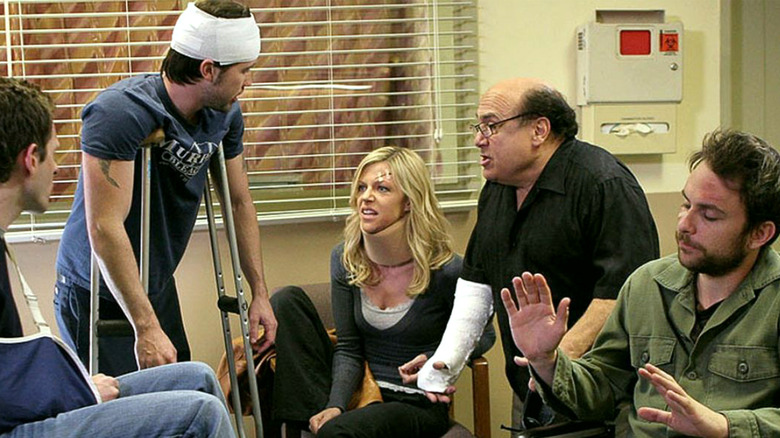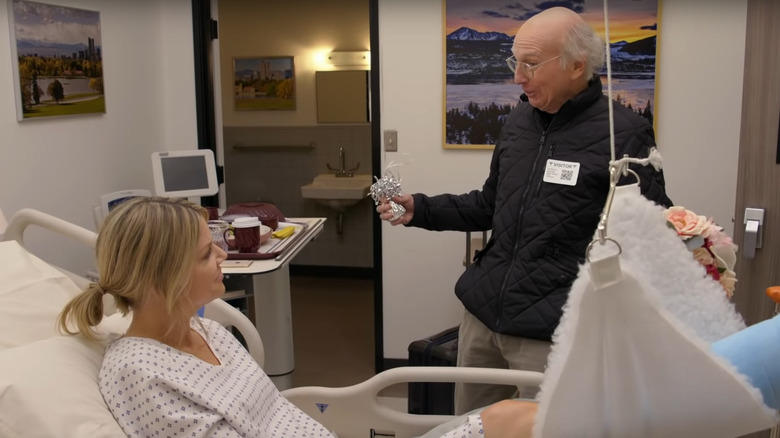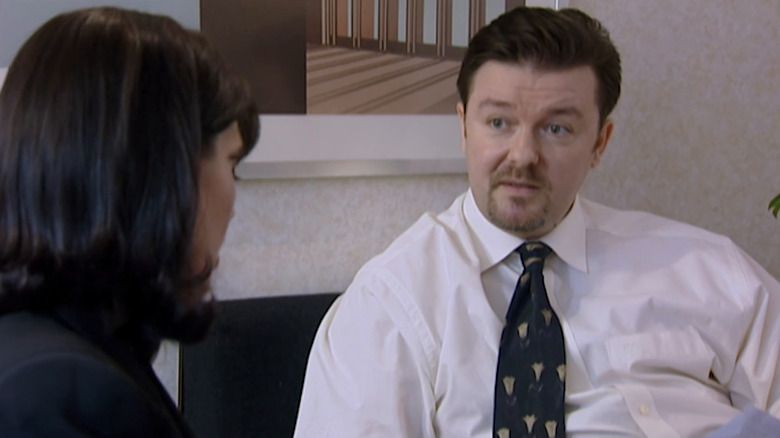How It's Always Sunny In Philadelphia Was Born Out Of The British Office And Curb Your Enthusiasm
Of all the ways to describe "It's Always Sunny in Philadelphia," the phrase "'Seinfeld' on crack" is perhaps the most popular. Both shows follow around a few eccentric, petty, self-absorbed friends who are each incapable of maintaining any kind of meaningful relationship outside of their own closed-off group. The difference is that the characters on "Seinfeld" weren't sniffing glue or beating up the local children.
For the creators of "Always Sunny," however, the main inspirations were not exactly "Seinfeld," but two newer, more experimental shows. On Conan O'Brien's podcast, Charlie Day explained how, when they were making the decision to film their own sitcom, they based it on the success of the British version of "The Office," and Larry David's "Curb Your Enthusiasm."
"We were looking at the British 'Office,' and how sort of cheap it looked. It just seemed very handheld and very easy to shoot, and the lighting just seemed like they just threw on the lights in an office and filmed it," Day said. "'Curb' had just come out around then and it felt the same... Glenn [Howerton] or someone had stumbled upon this camera [the Panasonic DVX 100A], and it kind of looked like those shows, but it was an affordable camera. So that combination of an attainable look with an affordable camera and we thought, 'Well, we could shoot something.'"
So, they made two cheap early episodes of the show and sent them off to producers. While they were waiting for a response, they worked on their third episode, which was when things really started to come together. "We started to find our voice and our timing and get a little bit better how to use the camera," Day explained.
The Curb parallels
Day's description of those early days is of a show that went through slow but steady improvement. It took them a while to get an offer from FX, and even then they had a low budget and only seven episodes. "Then they [FX] were like, 'Okay, we're gonna cancel the show unless you can get a big name attached,' and Danny DeVito had seen the show and liked it, and then here we are," Day said. Although "It's Always Sunny in Philadelphia" season 1 is still a perfectly acceptable string of episodes, most fans can agree that the show didn't truly get going until Frank Reynolds joined the gang.
The slow start is fitting, considering that "Curb Your Enthusiasm" also arguably took a little while to find its footing. Although the post-"Seinfeld" Larry David had a lot less trouble finding funding for his show, his first season relied a little too much on the "cringe" part of the show's "cringe comedy" style, leading to episodes that are so agonizing to watch that you have to brace yourself beforehand. Episodes like "Affirmative Action," where Larry takes forever to fulfil the simple task of refilling his wife's prescription, or "Interior Decorator" where Larry spends what feels like twenty minutes arguing over a parking garage toll mix-up, feel more like stressful fever dreams than entertaining sitcom episodes.
"Curb" got better and better as it gradually threw more wackiness into the mix, then it became the best comedy on TV in season 6 when it finally introduced J.B. Smoove's character, Leon. Likewise, "Always Sunny" got better the more it embraced the characters' more insane qualities. Dennis, Dee, Mac, Charlie and Frank are all far sadder and more depraved today than they were when we first met them, and most fans would agree that's probably for the best.
The Office parallels
It also makes sense that Day clarifies he's talking about the British version of "The Office," because the British edition is a far crueler show than its American counterpart. Its version of a Jim/Pam storyline is a lot darker, and its equivalent of Michael Scott doesn't get any kind of redemption arc. The British show is absolutely brutal, to the point that a lot of viewers find a regular episode more unbearable than the most awkward moments in "Curb."
"Always Sunny" has similarly embraced that show's sense of cruelty. Its characters are filled with narcissistic losers who occasionally warrant sympathy from the audience, before reminding us once again that they don't deserve it. The audience might feel bad for Dee sometimes as she's the most mistreated in the group, but then she tricks a male stripper into grinding on his daughter. We're tempted to feel bad for Charlie as the sweet dumb one in the group, but then he brutally dumps his new girlfriend in front of her friends and family, telling her he'd just been using her this whole time. Not only are we not supposed to root for these characters, but the show punishes us for doing so.
Although there are plenty of differences between these two shows and "Always Sunny," their roles in creation of the hit FX show can't be forgotten. These were the shows that inspired Charlie Day, Glen Howerton, and Rob McElhenney to stop waiting for TV auditions and start making TV of their own. "You know, why wait?" Day said on Conan's podcast. "Why sit around and wait for another one of these [auditions] and then you don't even necessarily like what you're being given the opportunity to do? Why not just shoot something ourselves?"


